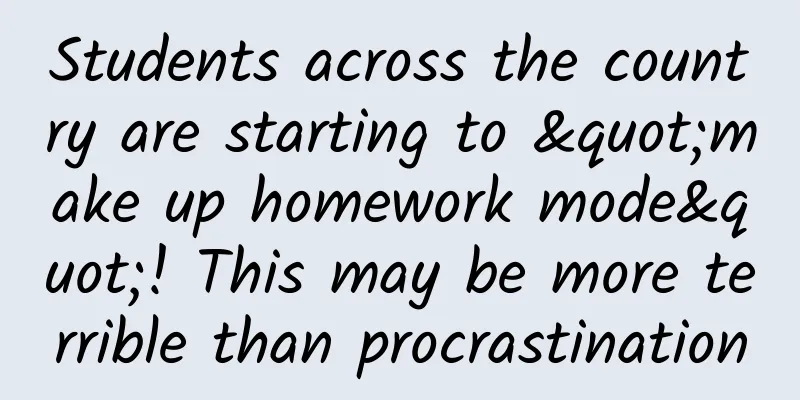Students across the country are starting to "make up homework mode"! This may be more terrible than procrastination

|
At the end of winter vacation, many children have entered the "catch-up homework mode". "How much homework does your child have left?" "Do you know how much homework my child has left!" have also become topics of daily communication among parents. Some parents are also beginning to worry: "My child always waits until the last few days of the holiday to make up homework. Isn't this a case of procrastination at such a young age?" Copyright images in the gallery. Reprinting and using them may lead to copyright disputes. In fact, judging from the classification indicators of psychological disorders and mental illnesses, "childhood procrastination" is not an objectively existing psychological disease, and there is no so-called "procrastination" in clinical practice. If a child simply needs to make up for holiday homework, there is no need to worry that the child has encountered some psychological problems that must be resolved. However, it is worth reminding that if the child experiences anxiety, fear, and anger that far exceeds the normal degree and frequency when making up homework, parents still need to pay more attention. But children's procrastination itself is indeed a problem that parents are scratching their heads about. What should we do about it? First of all, we need to understand the principle behind it. Procrastination is an emotion regulation problem Most parents have a wrong understanding of their children’s procrastination from the beginning. Many parents believe that procrastination is a problem of time management, so they have been committed to helping their children with time management and setting the amount of homework in different time periods. When they find that the holiday is about to end, the most common criticism from parents is “If you had already done it before, why do you need to catch up now!” This is actually wrong. Tim Pychyl, a psychology professor at Carleton University who began studying procrastination 20 years ago, offers a very intuitive explanation for why it happens: procrastination is an emotion regulation problem, not a time management problem. Copyright images in the gallery. Reprinting and using them may lead to copyright disputes. This sentence is not only applicable to adults, but also to children. Think about it, as professionals, when we think of the deadline of a report, PPT, or summary, what is the first emotion that rushes into our minds? It is most likely not a strong internal drive, but more likely to be stress, irritability, and anxiety. Logically speaking, the best way to deal with these negative feelings is to finish what needs to be done as quickly as possible, but there is a method that can actually have a simpler and more direct effect on emotions: if the report I give to the client makes me so anxious, then I can just watch another episode of a TV series to calm down, right? Procrastination arises from this. Its essence is not that we lack the means to manage time, but that we adopt emotional management techniques that are like drinking poison to quench thirst. Why do children procrastinate? Kids face even more challenges than we do when it comes to procrastinating on holiday homework. First, children’s perception of medium and long-term time is not as good as that of adults. To put it bluntly, children may be better at planning “what to do this afternoon” and “what to do tomorrow”, but for longer time periods, such as “what to finish in this month” and “what to finish before school starts in two months”, they don’t have such a strong sense of control. It is not mentally realistic to ask an eight-year-old to understand what a "three-year plan" is. Similarly, they also have psychological difficulties in controlling and planning the overall time of the holiday. Secondly, parents’ urging actually deprives children of their self-identity as the subject of behavior. When it comes to making up homework, it is very easy to see the situation of “the emperor is not anxious, but the eunuch is anxious.” Many times, parents are extremely anxious and constantly question their children: I am so anxious, why are you not anxious? However, psychologically, it is likely that it is precisely because the parents are anxious that the children do not take it so seriously. They may subconsciously think: "If you are so concerned about this matter, then it must be your business. Since it is your business, why should I be anxious?" The most direct result is procrastination. Copyright images in the gallery. Reprinting and using them may lead to copyright disputes. Thirdly, the rhythm of life during holidays is chaotic, and procrastination becomes a safe card that becomes more and more convenient the more you use it. The biggest difference between holidays and school days is the daily routine and rhythm of life. The same child can get up at 7 o'clock every day when he is in school, but during holidays, he may not be able to wake up until 8:30. During the holidays, you may return home, travel, attend training camps, and even spend a lot of time on the road, which is bound to cause huge fluctuations in your work and rest schedule, which in turn leads to "put it aside first", "do it tomorrow", and "write it later" becoming the norm, gradually squeezing the time to complete homework to the end of the holiday. Three types of procrastination in children “Emotional Power Pathway” Meanwhile, there are three "emotional dynamics pathways" that best explain why kids procrastinate. The first type is the hedonistic children who have difficulty resisting temptation and have poor delayed gratification ability. The main reason why some children have homework piled up at the end of the holiday is that there are too many temptations during the holiday. Regardless of whether they are taken to dinner parties by their parents, or go to their grandparents' house to play, or secretly stay at home to play with their phones - which one is not more interesting than doing homework? This kind of children is the most numerous, and their psychological mechanism is the easiest to understand. The second type is the combative type of children who are obsessed with confronting their parents and use not doing homework as a weapon. In educational psychology, there is a concept called the "overlimit effect", which refers to the fact that constantly instilling and conducting a certain kind of education will not only fail to achieve better educational results, but may even drive the other party to a corner and cause confrontation. In some families, parents go too far in making demands and giving instructions on their children's winter vacation homework, even forcing the children to the opposite side - if you make me annoyed, I will make you unhappy. For a child, if doing homework is a natural and right thing to do, but at the same time he has to show his disobedience to his parents, what can he do? The most clever thing he can think of is to "slow down". Is there any other way to drive parents crazy than procrastination, but without making a huge mistake? The third type is the type of children who just give up and don’t worry about finishing their homework. The biggest problem for these children is not laziness or stubbornness, but lack of confidence. When they look at their winter vacation homework, their legs become weak first, so how can they talk about climbing and climbing? Many parents place far more demands on their children than on their psychological preparation, only emphasizing "you have to do it" without communicating "you can do it", which causes some children to give up before they even start. If they are so self-abased that they don't even want to pick up a pen, this is of course also a form of procrastination in the eyes of outsiders. What should I do if my child keeps procrastinating? There are also some methods worth trying that can help children prepare mentally for making up their homework. First, children are better at short-term planning and not good at long-term planning, so you can make a countdown task plan from today to the start of school. As the holiday draws to a close, the whole family sees that there is still a lot of homework to be done, which inevitably makes the children sigh and the parents angry. At this time, you must not "just do it and be done". Although children may not be particularly good at planning and executing time management spanning more than a month, four to five days to a week is still feasible. After all, in school, the smallest rotation unit of the curriculum is usually "week". You can hold a small meeting with your child first and divide the things that need to be done into each day before school starts. This not only breaks down the huge tasks in the eyes of the child, but also allows daily work to be carried out in a rhythmic manner. The author of this article helps his children develop a homework plan Second, for most families, when homework needs to be made up, the first thing to do is not to rush to make up the homework, but to quickly adjust the family's life rhythm and schedule. This not only helps with making up the homework, but also helps children to concentrate as soon as possible after school starts and quickly return to the learning state. Many families have experienced traveling or returning home during the holidays. Even if they have not, their life rhythm has definitely been affected by the gatherings and entertainment during the New Year. Therefore, it is strongly not recommended to frantically make up homework two days before school starts, writing from morning to night, and "sticking to it to the end" to make up homework. Instead, it is recommended that parents adjust the rhythm of life of the whole family in advance, to leave enough space for making up homework, and secondly to complete the necessary work after school starts in advance. Third, unfinished homework is far less terrible than the anxiety that permeates the family. As a parent, your ally is the child, not the homework. Unfinished homework can make parents anxious, but please understand that homework and study are things that children need to do on their own, and parents cannot replace them. Precisely because they cannot replace their children, parents may become angry, nagging, and irritable, and the damage to family relationships may be greater than the winter vacation homework that is not completed on time. Fourth, if you are really annoyed by your child doing make-up homework, you might as well try to look at it with a "growth mindset" - is it possible that making up homework is a good thing? "Growth mindset" comes from psychologist Carol Dweck and has a very wide application in the field of educational psychology. It emphasizes a perspective that looks to the future and potential. When it comes to making up homework, the question is, "Does making up homework mean that some kind of ability is improved?" Making up homework can also be a training for the brain, mind and stress resistance. As an adult, it is inevitable to encounter times when "the client wants it now" and "the boss wants to ask right away". Maybe the child who makes up homework today will be a master who can handle urgent and difficult tasks in his career tomorrow! In this way, making up homework is also a kind of practice. References [1]Pychyl, TA (2013). Solving the procrastination puzzle: Aconcise guide to strategies for change. Tarcher Perigee. [2] Huang Xiting, & Zhang Zengjie. (1979). Experimental study on time perception of children aged 5 to 8 years. Acta Psychologica Sinica, (2), 166-174. [3] Tang Jinhong. (2002). Psychological over-limit effect and its overcoming in education and teaching. Modern Primary and Secondary Education, (6), 31-32. [4]Medina, J. (2011). Brainrules:12principlesforsurvivingandthrivingatwork,home,andschool.ReadHowYouWant.com. [5]Stixrud,W.,&Johnson,N.(2019).Theself-drivenchild:Thescienceandsenseofgivingyourkidsmorecontrolovertheirlives.Penguin. [6]Dweck, CS (1986). Motivational processes affecting learning. American psychologist, 41 (10), 1040. This article is a work of Science Popularization China-Starry Sky Project Produced by: Science Popularization Department of China Association for Science and Technology Producer|China Science and Technology Press Co., Ltd., Beijing Zhongke Xinghe Culture Media Co., Ltd. Author: Ye Zhuang, psychologist, member of the Chinese Psychological Society Review | Zhang Xin, Associate Professor and Doctoral Supervisor, School of Psychology and Cognitive Science, Peking University |
<<: How to show your "scientific literacy" when others are playing in the snow? | Expo Daily
>>: How does the "fat drama" in the body affect our health?
Recommend
How to plan and promote an operational activity well?
Without further ado, here are the answers: 1. Cla...
iOS view, exploration of animation rendering mechanism
When developing a terminal, the first thing to co...
Forget to bring your keys when driving: Facial recognition technology will help you resolve the embarrassment
According to the British Daily Mail, Jaguar Land ...
The most tricky kind of meat in supermarkets, I don't recommend buying it, it's a waste of money
In the past two years, the price of pork was rela...
Live streaming sales: Solve these 3 fatal problems first
Today, I suddenly felt like talking to you about ...
How to leverage Halloween? Combining 14 cases including Durex, Gucci, Ele.me, etc., we will teach you step by step!
Halloween is coming~~ The KFC posters downstairs ...
620 light-years away, astronomers have directly proved for the first time: the presence of iron in the atmosphere of an exoplanet
[Mobile software: Bo Ke Yuan] An international re...
How to plan a successful event marketing? You need these 3 traits!
Before officially launching event marketing , you...
Drilling for combustible ice at 2,000 meters deep sea, "Manatee II" is really awesome!
At around 23:00 on April 7, 2021, my country'...
iOS 11.3 supports importing medical records, which will lead to a medical revolution
Just imagine how convenient it would be if every ...
China Electronics Technology Standardization Institute: White Paper on Enterprise Digital Transformation (2021 Edition)
The digital economy is the future development dir...
When others are following the marketing trend, what else can you think about?
The time period when I wrote this article was both...
What exactly is brand planning planning?
The term brand planning has now become a popular ...
How to plan an event well? Just 3 steps!
After reading thousands of cases, why don’t you k...
When will the Shanghai epidemic end in 2022 and return to normal? Can May Day end and return to normal? Attached the latest news
Recently, the number of new local cases and asymp...









